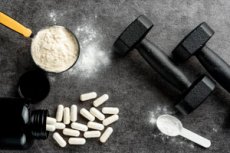Why Gym Goers Need to Beware of Testosterone Supplements for Muscle Building
Last reviewed: 14.06.2024

All iLive content is medically reviewed or fact checked to ensure as much factual accuracy as possible.
We have strict sourcing guidelines and only link to reputable media sites, academic research institutions and, whenever possible, medically peer reviewed studies. Note that the numbers in parentheses ([1], [2], etc.) are clickable links to these studies.
If you feel that any of our content is inaccurate, out-of-date, or otherwise questionable, please select it and press Ctrl + Enter.

The desire for a sculpted physique is leading some gym-goers to experiment with synthetic steroids, particularly testosterone supplements. This trend is largely driven by social media, where thousands of posts discuss ways to increase testosterone levels and influencers promote the supposed benefits of using the synthetic hormone and even recommend products that can be purchased online without a prescription.
However, while synthetic testosterone may improve your appearance in the short term, its long-term effects on your health should not be ignored.
Testosterone is a steroid hormone that plays a role in the functioning of all organs in our body. Testosterone is produced in both men and women, although approximately 15 times more of it circulates in men's bodies than in women.
Testosterone not only stimulates sexual development and puberty, but also helps build muscle mass and control bone growth. It improves our strength, endurance and cardiovascular fitness.
Many factors can naturally increase testosterone production, including exercise, stress, and sex.
But using synthetic testosterone supplements to increase levels of the hormone, especially in amounts above the body's natural production, will have a significant impact on your health.
Initially, this may lead to an increase in sex drive and help the body build more muscle mass within a few months. It can also cause acne, male pattern baldness and breast enlargement in men. Women may experience amenorrhea (loss of menstruation), increased body hair growth, deepening of the voice, and enlargement of the clitoris.
But these side effects are minor compared to the serious consequences that long-term and repeated abuse has on the body.
Steroid abuse changes the heart, causing it to enlarge, increasing blood pressure and decreasing the elasticity of the arteries. All of these changes make it harder for the heart to work, increasing the risk of sudden death. Cardiovascular changes persist in most abusers.
Liver and kidney damage often develop in people who use steroids for a long time.
Testosterone also has psychological effects, including increased aggression, depression and anxiety.
Critically, testosterone supplements disable the normal mechanisms for producing this hormone in the brain. This causes hypogonadism, a condition in which tissues that normally produce testosterone shrink in volume. In men, this leads to a decrease in sperm count and testicular volume.
Hypogonadism also contributes to a wide range of withdrawal symptoms. Some of these symptoms includedepression and decreased libido, unless more testosterone is used.
Many men who abuse steroids become hypogonadal and require lifelong testosterone replacement therapy.
A growing problem The International Olympic Committee and the World Anti-Doping Agency banned testosterone and other anabolic steroids after the 1972 Olympics. Their reasoning was that although these agents increase physical performance, they also have serious health consequences.
However, more than 40 years after this international ban, the use of anabolic steroids continues among some athletes. For example, in 2021, between 29% and 43% of professional athletes in Iran were reported to have abused these drugs. In a 2023 Australian study of 32 athletes (mostly women), about 43% of respondents reported using drugs to improve performance and appearance.
However, professional athletes now make up only a small part of the global doping problem. The cosmetic use of testosterone by non-athletes who want to improve their self-esteem and physical appearance has meant that anabolic steroid abuse has become a public problem. Some reports estimate that around 1 million people in the UK take steroids such as testosterone.
But given the well-known risks and harms of testosterone use, why would anyone decide to use it and continue to use it even experiencing serious health problems? Experts have been trying to solve this issue for many years.
One reason may be that users perceive health problems as a future concern, and that these problems are an acceptable risk to achieve better fitness or appearance in the short term.
Anabolic steroid dependence may play a role by affecting judgment and reducing awareness of potential harm.
The Goldman Dilemma may also provide some insight. From 1982 to 1995, Bob Goldman, a physician and essayist, posed a Faustian hypothetical question to elite athletes: Would they be willing to take a magic pill that would ensure success at the Olympics, but which would also lead to their death five years from now?
He reported that about half of the athletes surveyed accepted the “gold for death” option. In the 2012-2013 follow-up study, this proportion was lower, 7%-14%, with elite athletes being the most likely to choose gold over death.
There is no doubt that abuse of testosterone and its synthetic analogues can lead to harm, but many continue to abuse them. International bans were not effective. With the growing number of non-athletes abusing testosterone, more needs to be done to educate the public about its many long-term health effects.
